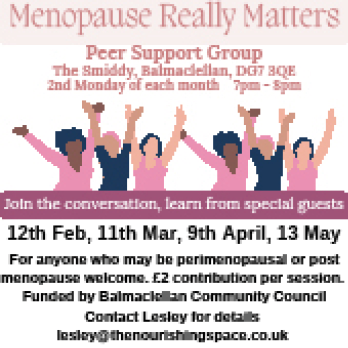Why menopause really matters
Perhaps it feels like you’re hearing a lot about menopause these days with celebrities making TV programmes about it and hormone replacement therapy (HRT) shortages making the news.
However, it wasn’t that long ago that menopause was hardly ever talked about. Like many things in our patriarchal society ‘women’s issues’ were taboo, under-researched medically and confined to women-only conversations.
I’d like to encourage more people to talk about this topic. Half the population will experience this natural biological process. Around 13 million women (including non-binary and trans-people) are currently menopausal! We all know and have connections with women in many ways.
Menopause usually happens between the ages of 45-55 according to NHS data. Actual menopause is just one day, twelve months from the last menstrual period when the ovaries have stopped producing eggs. You’ll only know you’re menopausal retrospectively unless you start to notice symptoms of perimenopause. Menopause can also occur when the ovaries are damaged by specific treatment such as chemotherapy or radiotherapy, or when the ovaries are removed via a hysterectomy.
Perimenopause is the time when a woman's hormones are fluctuating, and noticeable symptoms may occur. This can start 10-15 years before menopause, ie from the age of 30! Around a third of women will experience no symptoms, another third will have some, but manageable symptoms, and a further third will experience debilitating symptoms.
There are 34 recognised common symptoms of menopause, but many more are possible. Whilst many of us are aware of the potential hot flushes, mood swings and the stopping of bleeding often attributed to ‘older’ women, these are often not the first signs and much younger women can be affected. Low stress threshold, anxiety, panic attacks, low self-esteem, brain fog and even suicidal thoughts can often be the first signs of a change in hormones. This is often why many women are wrongly prescribed anti-depressants when HRT would be more effective. A confusing time for both patient and GP! Please seek help if this is the case for you or your loved one. There are resources listed at the end of the article.
HRT has wrongly been stigmatised by an old research paper from the Women’s Health Initiative research in 2002. New medicines (transdermal) and early prescribing (before 60 years old) have made these body-identical HRT drugs more protective than risk increasing. Though not everyone who may need it can take HRT, there are many natural remedies and lifestyle changes which can reduce symptoms.
While this transition can be challenging for some women, there are many things you can do to have a healthy menopause. We talk about these in our Menopause Really Matters peer support group at Balmaclellan Smiddy. These are held on the second Monday of each month. Stress reduction, eating well, staying active, adequate sleep and looking after your own needs can all help greatly.
Remember, menopause is a natural process, and while it can be challenging there is plenty of support and good information out there to empower you through this phase.
Some links for further information are:
Dumfries menopause services helpline (Thursday mornings only) 01387 241121
Lesley Atkins

